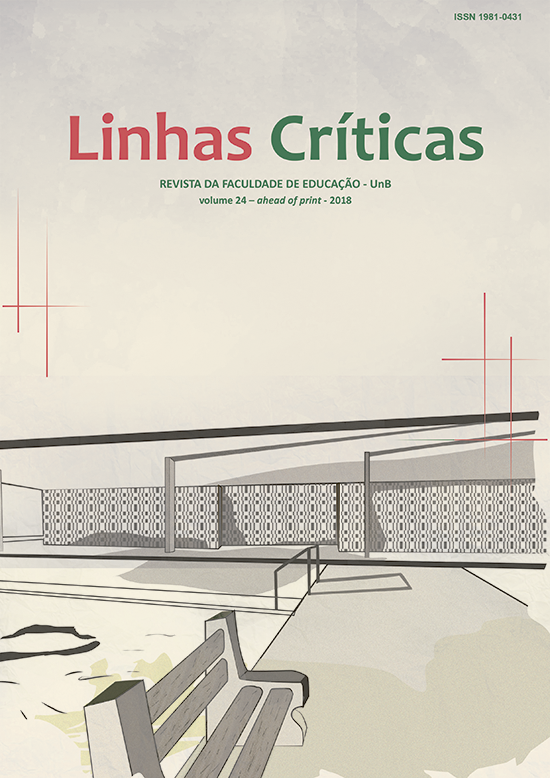A questão do exílio em Theodor Adorno e Paulo Freire
DOI:
https://doi.org/10.26512/lc.v24i0.19689Keywords:
Theodor Adorno, Paulo Freire, Exile, Totalitarianism, EducationAbstract
The essay discusses the question of exile and totalitarian ideologies in the lives of two great critical intellectuals, Theodor Adorno and Paulo Freire, who, in expressing their positions of denunciation of explorations and injustices in the face of the rigidity of the thinking of the time, were forced into exile. Such conceptions, although distinct, converge on the enlightening path of the (in) success of formative experience through education, for it is understood with Adorno that education is an experience of reeducation of the managed society, while Freire is a possibility of political emancipation, autonomy of action towards the dialogical humanization and overcoming the state of oppression and alienation by the school.
Downloads
References
Adorno, Theodor Ludwig Wiesengrund. (1995). Educação e Emancipação. Rio de Janeiro: Paz e Terra.
Adorno, Theodor Ludwig Wiesengrund. (1993). Mínima moralia: reflexões a partir da vida danificada. Trad. Luiz Eduardo Bica. 2. ed. São Paulo: Ática.
Adorno, Theodor Ludwig Wiesengrund. (2005). A atualidade da filosofia. Primeira Versão, Porto Velho, Ano IV, n. 195, p. 2-12. Disponível em: <http://www.primeiraversao.unir.br/atigos_pdf/195_.pdf>. Acesso em: 15 jun. 2018.
Adorno, Theodor Ludwig Wiesengrund; Horkheimer, Max. (1985). A Dialética do Esclarecimento. Rio de Janeiro: Jorge Zahar.
Agamben, Giorgio. (2004). Homo Sacer. O poder soberano e a vida nua I. Trad. Henrique Burigo. Belo Horizonte: Editora UFMG.
Arendt, Hannah. (1989). Origens do totalitarismo. Trad. Roberto Raposo. São Paulo: Companhia das Letras.
Benjamin, Walter. (1994). Obras escolhidas I: magia e técnica, arte e política. São Paulo: Brasiliense.
Freire, Paulo. (2001). A educação na cidade. 5. ed. São Paulo: Ed. Cortez.
Freire, Paulo. (2003). Pedagogia da Esperança: um reencontro com a Pedagogia do Oprimido. 11. ed. São Paulo: Paz e Terra.
Freire, Paulo. (2002). Pedagogia do oprimido. 34. ed. Rio de Janeiro: Ed. Paz e Terra.
Freire, Paulo. (2009). Educação como prática da liberdade. Rio de Janeiro: Paz e Terra.
Freire, Paulo; Faundez, Antonio. (1985). Por uma pedagogia da pergunta. Rio de Janeiro: Paz e Terra.
Mashiba, Glaciane Cristina Xavier. (2013). Emancipação humana em Theodor Adorno e Paulo Freire. 2013. 150 f. Tese (Doutorado em Educação) - Universidade Estadual de Maringá, Maringá.
Perius, Oneide. (2006). Esclarecimento e dialética negativa: sobre o além-do-conceito em Theodor Adorno. 2006. 113 p. Dissertação (Mestrado em Filosofia) - Pontifícia Universidade Católica do Rio Grande do Sul, Porto Alegre.
Pucci, Bruno. (1997). Filosofia negativa e Educação: Adorno. Filosofia, sociedade e educação, Marília, v. 1, n. 1, p. 163-192.
Ribeiro, Adelia Maria Miglievich. (2011). Intelectuais no exílio: onde é a minha casa? Dimensões, v. 26, p. 152-176.
Said, Edward. (2003). Reflexões sobre o exílio e outros ensaios. Trad. Pedro Maia Soares. São Paulo: Companhia das Letras.
Silva, Alexandre Rodrigo Nishiwaki da. (2011). Conhecimento e conscientização: a historicidade do pensamento de Paulo Freire. 2011. 142 f. Dissertação (Mestrado em Ciências Humanas) - Universidade Federal de São Carlos, São Carlos.
Szniter, Célia. (1996). A Dimensão Visual da Propaganda Nazista: as imagens do judeu e do ariano. 1996. 175 p. Dissertação (Mestrado em Letras Orientais) - Universidade de São Paulo, São Paulo.
Published
How to Cite
Issue
Section
License
Copyright (c) 2018 Revista Linhas Críticas

This work is licensed under a Creative Commons Attribution 4.0 International License.
Authors who publish in this journal agree to the following terms:
-Authors maintains the copyright and grants the journal the right of first publication, the work being simultaneously licensed under the Creative Commons Attribution License which allows the sharing of the work with recognition of the authorship of the work and initial publication in this journal.
- Authors are authorized to enter into additional contracts separately, for non-exclusive distribution of the version of the work published in this journal (eg publish in institutional repository or as a book chapter), with acknowledgment of authorship and initial publication in this journal.
-Authorers are allowed and encouraged to publish and distribute their work online (eg in institutional repositories or on their personal page) at any point before or during the editorial process, as this can generate productive changes as well as increase the impact and the citation of published work (See The Effect of Free Access).



